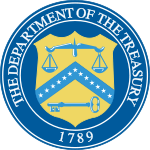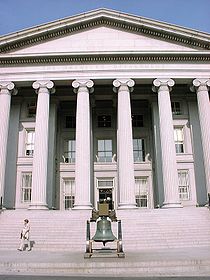- Treasurer
-
Finanzministerium Eingerichtet: 2. September 1789 Minister Timothy F. Geithner Stellvertreter Haushalt: 11,1 Mrd (2004) $ Angestellte: 115.897 (2004) Das Finanzministerium der Vereinigten Staaten von Amerika (United States Department of the Treasury) ist Teil der Bundesregierung des Staates und zuständig für die Erhebung, Verwaltung und Ausgabe der öffentlichen Einnahmen. Es wurde am 2. September 1789 per Beschluss des Kongresses eingerichtet. Sitz des Ministerium ist Washington D.C. Das Gebäude ist auf der Rückseite der 10-Dollar-Note abgebildet, dessen Vorderseite das Bild Alexander Hamiltons zeigt.
Das Finanzministerium wird geleitet vom Secretary of the Treasury, dessen Amt dem deutschen Finanzminister entspricht, und dem Treasurer of the United States, der etwa die Rolle eines Vize-Finanzministers übernimmt. Es ist unterteilt in zwölf Abteilungen (Bureaus), die sämtliche fiskalpolitische Aufgaben übernehmen. Zu diesen Aufgaben zählen die Steuer-, Zoll-, Währungs- und Wirtschaftspolitik, die Geldproduktion und die Aufsicht über die Einhaltung der Gesetze. Der Finanzminister ist der oberste Berater des Präsidenten in Wirtschaftsfragen und verantwortlich für die natioale und internationale Finanz- und Steuerpolitik der Vereinigten Staaten. Er überwacht die Finanzen der Bundesregierung der Vereinigten Staaten und die Finanzbehörden. In seiner Kompetenz liegt heute vor allem die Münzprägung.[1] Die Unterschrift des Treasurers muss, genauso wie jene des Finanzministers, auf jeder gültigen Banknote des US-Dollars zu sehen sein.
Nach der Bildung des Heimatschutzministeriums im Jahr 2003 wurden einige Abteilungen des Finanzministeriums in andere Ministerien verlegt, darunter das Bureau of Alcohol, Tobacco and Firearms (ATF), der Customs Service und der Secret Service. Der Finanzminister ist Mitglied des Kabinetts und seit der Präsidentschaft von Bill Clinton Mitglied des Nationalen Sicherheitsrates. Der Finanzminister steht in der Nachfolge des Präsidenten an fünfter Stelle.
Erster Finanzminister der USA war Alexander Hamilton, derzeit bekleidet Timothy F. Geithner dieses Amt. Interessanterweise gibt es das Amt des US-Treasurers etwas länger als das eigentliche Finanzministerium. Es existiert schon seit 1777.
Zum Ministerium gehören unter anderem:
- Internal Revenue Service (Finanzamt für Bundessteuern, abgekürzt IRS)
- Bureau of Engraving and Printing (Banknotenherstellung des US-Dollars)
- United States Mint (Münzprägestätte des US-Dollars)
- Financial Crimes Enforcement Network (abgekürzt FinCEN), eine Ermittlungsbehörde [2]
- Staatlicher Börsenstabilisierungsfonds (auch Exchange Stabilization Fund genannt)
Inhaltsverzeichnis
Liste der US-Finanzminister
Nr. Bild Name Amtszeit unter US-Präsident 1 Alexander Hamilton 11. September 1789–31. Januar 1795 George Washington 2 Oliver Wolcott Jr. 3. Februar 1795–31. Dezember 1800 George Washington, John Adams 3 Samuel Dexter 1. Januar 1801–13. Mai 1801 John Adams, Thomas Jefferson 4 Albert Gallatin 14. Mai 1801–8. Februar 1814 Thomas Jefferson, James Madison 5 George W. Campbell 9. Februar 1814–5. Oktober 1814 James Madison 6 Alexander J. Dallas 6. Oktober 1814–21. Oktober 1816 James Madison 7 William H. Crawford 22. Oktober 1816–6. März 1825 James Madison, James Monroe 8 Richard Rush 7. März 1825–5. März 1829 John Quincy Adams 9 Samuel D. Ingham 6. März 1829–20. Juni 1831 Andrew Jackson 10 Louis McLane 8. August 1831–28. Mai 1833 Andrew Jackson 11 William J. Duane 29. Mai 1833–22. September 1833 Andrew Jackson 12 Roger B. Taney 23. September 1833–25. Juni 1834 Andrew Jackson 13 Levi Woodbury 1. Juli 1834–3. März 1841 Andrew Jackson, Martin Van Buren 14 Thomas Ewing 4. März 1841–11. September 1841 William Henry Harrison, John Tyler 15 Walter Forward 13. September 1841–1. März 1843 John Tyler 16 John C. Spencer 8. März 1843–2. Mai 1844 John Tyler 17 George M. Bibb 4. Juli 1844–7. März 1845 John Tyler 18 Robert J. Walker 8. März 1845–5. März 1849 James K. Polk 19 William M. Meredith 8. März 1849–22. Juli 1850 Zachary Taylor 20 Thomas Corwin 23. Juli 1850–6. März 1853 Millard Fillmore 21 James Guthrie 7. März 1853–6. März 1857 Franklin Pierce 22 Howell Cobb 7. März 1857–8. Dezember 1860 James Buchanan 23 Philip F. Thomas 12. Dezember 1860–14. Januar 1861 James Buchanan 24 John Adams Dix 15. Januar 1861–6. März 1861 James Buchanan 25 Salmon P. Chase 7. März 1861–30. Juni 1864 Abraham Lincoln 26 William P. Fessenden 5. Juli 1864–3. März 1865 Abraham Lincoln 27 Hugh McCulloch 9. März 1865–3. März 1869 Abraham Lincoln, Andrew Johnson 28 George S. Boutwell 12. März 1869–16. März 1873 Ulysses S. Grant 29 William A. Richardson 17. März 1873–3. Juni 1874 Ulysses S. Grant 30 Benjamin H. Bristow 4. Juni 1874–20. Juni 1876 Ulysses S. Grant 31 Lot M. Morrill 7. Juli 1876–9. März 1877 Ulysses S. Grant, Rutherford B. Hayes 32 John Sherman 10. März 1877–3. März 1881 Rutherford B. Hayes 33 William Windom 8. März 1881–13. November 1881 James A. Garfield, Chester A. Arthur 34 Charles J. Folger 14. November 1881–4. September 1884 Chester A. Arthur 35 Walter Q. Gresham 5. September 1884–30. Oktober 1884 Chester A. Arthur 36 Hugh McCulloch 31. Oktober 1884–7. März 1885 Chester A. Arthur, Grover Cleveland 37 Daniel Manning 8. März 1885–31. März 1887 Grover Cleveland 38 Charles S. Fairchild 1. April 1887–6. März 1889 Grover Cleveland 39 William Windom 7. März 1889–29. Januar 1891 Benjamin Harrison 40 Charles Foster 25. Februar 1891–6. März 1893 Benjamin Harrison, Grover Cleveland 41 John G. Carlisle 7. März 1893–5. März 1897 Grover Cleveland, William McKinley 42 Lyman J. Gage 6. März 1897–31. Januar 1902 William McKinley, Theodore Roosevelt 43 L. M. Shaw 1. Februar 1902–3. März 1907 Theodore Roosevelt 44 George B. Cortelyou 4. März 1907–7. März 1909 Theodore Roosevelt 45 Franklin MacVeagh 8. März 1909–5. März 1913 William Howard Taft 46 William G. McAdoo 6. März 1913–15. Dezember 1918 Woodrow Wilson 47 Carter Glass 16. Dezember 1918–1. Februar 1920 Woodrow Wilson 48 David F. Houston 2. Februar 1920–3. März 1921 Woodrow Wilson 49 Andrew W. Mellon 4. März 1921–12. Februar 1932 Warren G. Harding, Calvin Coolidge,
Herbert Hoover50 Ogden L. Mills 13. Februar 1932–4. März 1933 Herbert Hoover 51 William H. Woodin 5. März 1933–31. Dezember 1933 Franklin D. Roosevelt 52 Henry Morgenthau 1. Januar 1934–22. Juli 1945 Franklin D. Roosevelt, Harry S. Truman 53 Fred M. Vinson 23. Juli 1945–23. Juni 1946 Harry S. Truman 54 John W. Snyder 25. Juni 1946–20. Januar 1953 Harry S. Truman 55 George M. Humphrey 21. Januar 1953–29. Juli 1957 Dwight D. Eisenhower 56 Robert B. Anderson 29. Juli 1957–20. Januar 1961 Dwight D. Eisenhower 57 C. Douglas Dillon 21. Januar 1961–1. April 1965 John F. Kennedy, Lyndon B. Johnson 58 Henry H. Fowler 1. April 1965–20. Dezember 1968 Lyndon B. Johnson 59 Joseph W. Barr 21. Dezember 1968–20. Januar 1969 Lyndon B. Johnson 60 David M. Kennedy 22. Januar 1969–10. Februar 1971 Richard Nixon 61 John B. Connally 11. Februar 1971–12. Juni 1972 Richard Nixon 62 George P. Shultz 12. Juni 1972–8. Mai 1974 Richard Nixon 63 William E. Simon 8. Mai 1974–20. Januar 1977 Richard Nixon, Gerald Ford 64 Werner Michael Blumenthal 23. Januar 1977–4. August 1979 Jimmy Carter 65 G. William Miller 7. August 1979–20. Januar 1981 Jimmy Carter 66 Donald T. Regan 22. Januar 1981–1. Februar 1985 Ronald Reagan 67 James Baker 4. Februar 1985–17. August 1988 Ronald Reagan 68 Nicholas F. Brady 15. September 1988–17. Januar 1993 Ronald Reagan, George Bush 69 Lloyd M. Bentsen 20. Januar 1993–22. Dezember 1994 Bill Clinton 70 Robert Rubin 11. Januar 1995–2. Juli 1999 Bill Clinton 71 Lawrence Summers 2. Juli 1999–20. Januar 2001 Bill Clinton 72 Paul O’Neill 20. Januar 2001–31. Dezember 2002 George W. Bush 73 John W. Snow 3. Februar 2003–Juli 2006 George W. Bush 74 Henry Paulson Juli 2006–Januar 2009 George W. Bush 75 Timothy F. Geithner Januar 2009– Barack Obama Amtierende Finanzminister
Wenn sowohl der Finanzminister als auch der stellvertretende Finanzminister amtsunfähig sind, kann jeder andere Unterstaatsekretär in das Amt vereidigt werden und so amtierender Finanzminister werden.
- William Jones amtierte zwischen dem Rücktritt von Alexander J. Dallas und der Ernennung von William H. Crawford.
- Weil der stellvertretende Finanzminister Roger Altman im August 1994 zurückgetreten war, amtierte Frank Newman vom 22. Dezember 1994 bis zum 11. Januar 1995.
- Kenneth W. Damn amtierte vom 31. Dezember 2002 bis zum 3. Februar 2003.
- Robert Kimmitt amtierte vom 30. Juni bis 9. Juli 2006.
- Stuart Levey amtierte vom 20. Januar 2009 bis zur Bestätigung von Timothy Geithner durch den Kongress am 26. Januar 2009.
Weblinks
- Homepage des US-Finanzministeriums (Englisch)
Arbeit | Äußeres | Bau | Bildung | Energie | Finanzen | Gesundheit | Handel | Heimatschutz | Inneres | Justiz | Kriegsveteranen | Landwirtschaft | Verkehr | Verteidigung
Historische Ministerien: Gesundheit, Bildung und Wohlfahrt | Handel und Arbeit | Krieg | Marine | Heer | Post
Quellen
- ↑ Duties & Functions (Englisch). United States Department of the Treasury. Abgerufen am 21. April 2009.
- ↑ Financial Crimes Enforcement Network – Offizielle Seite (Engl.)
- ↑ United States Department of the Treasury: Exchange Stabilization Fund 04.03.2009
Wikimedia Foundation.








































































